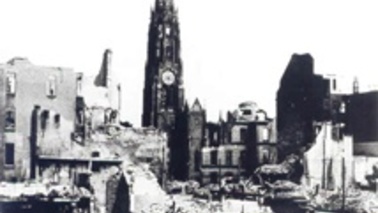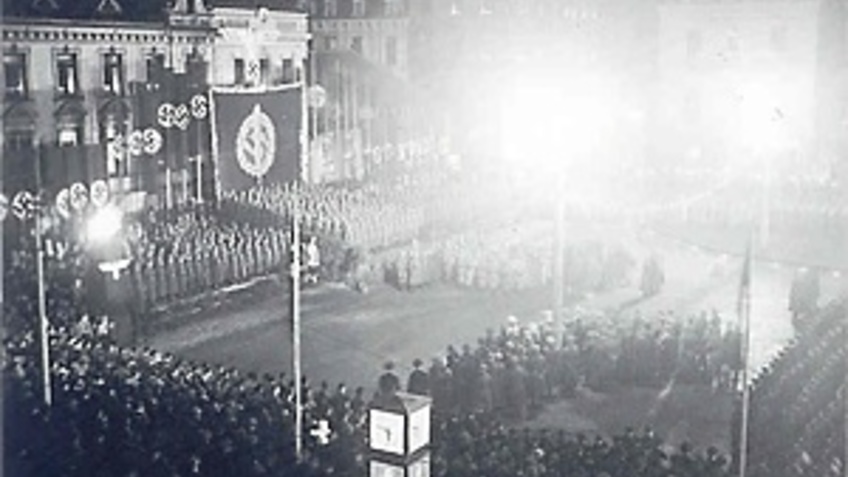
Nazi era and Second World War in Bremerhaven
The SA assembling on the square on 27th of November 1938 1944 (Photo: Municipal Archives Bremerhaven)
The world economic depression after 1929 boosted the Nazi movement also in Bremerhaven. In 1931, the first representatives of the National Socialist Party were elected to the local city parliament. In 1933, the Nazi party took complete control in Bremerhaven. That meant the beginning of suffering for numerous opponents of the “new order”. The liberal Lord Mayor of Bremerhaven Waldemar Becké (1878-1947), in office since 1923 and with some merits in the field of local urban development, was ousted in humiliating circumstances. His successor was the chairman of the local Nazi party branch, Julius Lorenzen, who acted until 1939.
The former Prussian fortification Langlütjen II saw use as one of the first provisional concentration camps, which were typical for the early Nazi era. Bremerhaven's Jewish citizens also soon suffered under the impact of the new ideology, many of them finally suffering the same terrible fate as a large part of the German and European Jewish population. It all started with with the boycotting of Jewish shops and firms. In the pogrom night of November 9th to 10th 1938, the synagogue in Geestemünde was destroyed. The remaining Jews (ca. 300) were deported to Minsk in 1941 (today: Belarus). Only three of them returned home in 1945. The most prominent holocaust victim from Bremerhaven was the warehouse owner Jeanette Schocken (1883-1942), who was also murdered at Minsk, the exact date being unknown. She had been dispossessed in 1938, when the state took over her two warehouses in Bremerhaven and Geestemünde.
The general economic upswing led to more employment also in the Bremerhaven region and rearmament brought work for the local shipbuilding industry. In 1939, Bremerhaven was united with two neighbouring communities, Lehe and Geestemünde and was from now on named Wesermünde, as these two parts had been since 1924. Only the port area remained in the hands of the City of Bremen.
Wartime bombing hit the city more and more after 1940. The most terrible attack occurred in the evening of September 18th 1944, when 206 Lancaster bombers of the Royal Air Force attacked the centre of the town and destroyed it within 20 minutes. 618 dead, 1193 wounded and 30,000 homeless were the result. 2070 buildings had been destroyed, also the historic early 19th century core. Only very few houses from that era are preserved today.
British armed forces moved in on May 7th 1945. On May 20th, they were relieved by the 29th US Infantry Division. Bremen and Bremerhaven became an enclave of the US zone in Germany. The US forces stationed in southern Germany began to use the port of Bremerhaven as an important logistical base, as the "Port of Embarkation".

